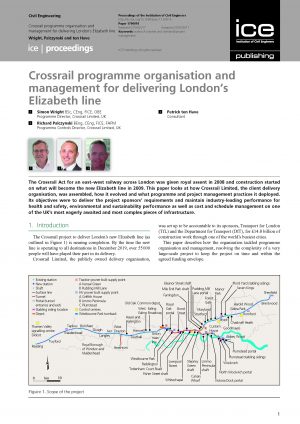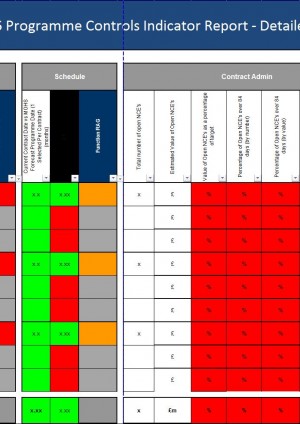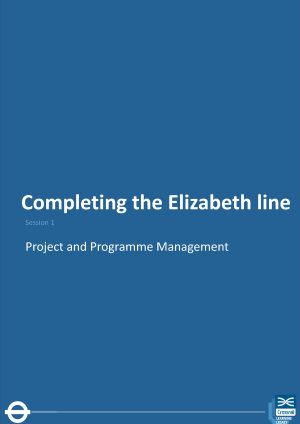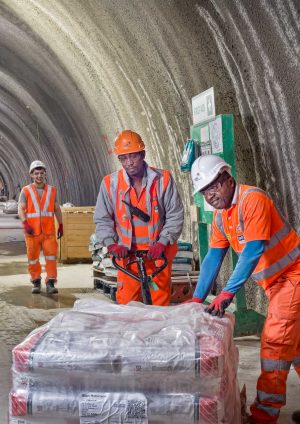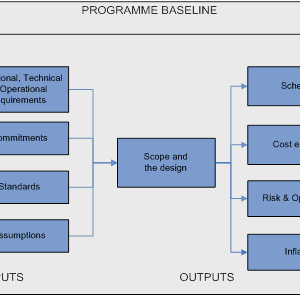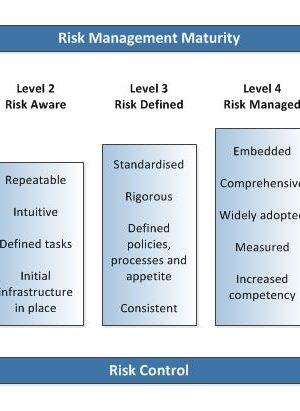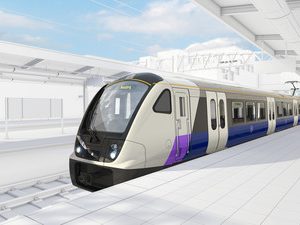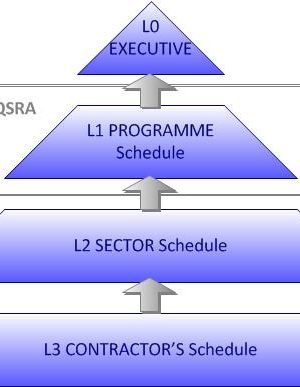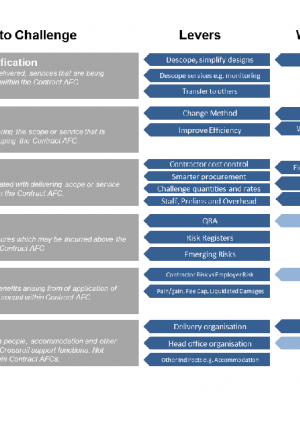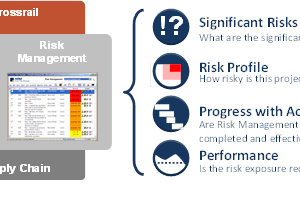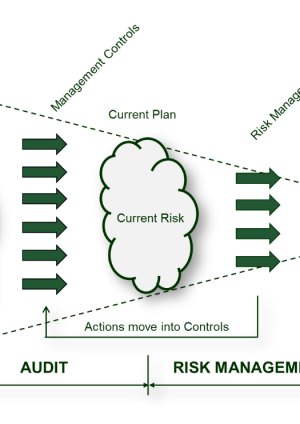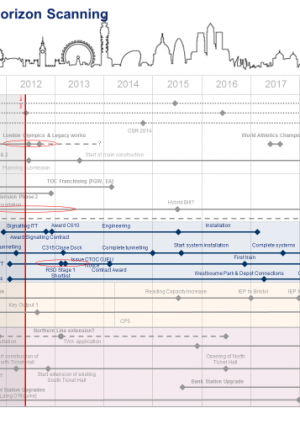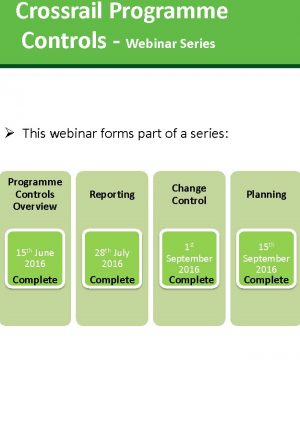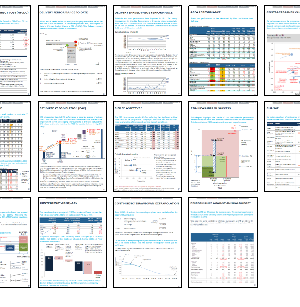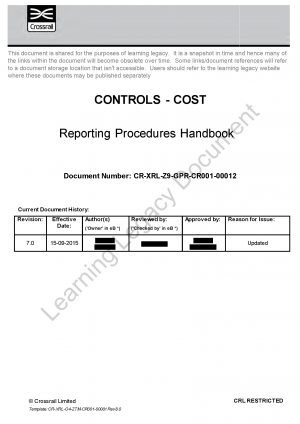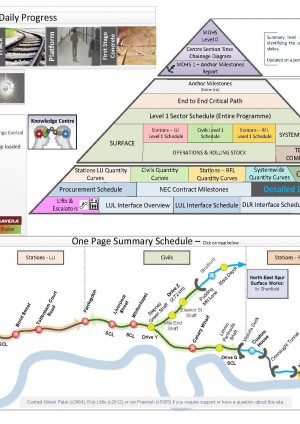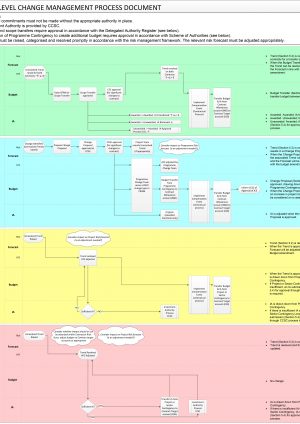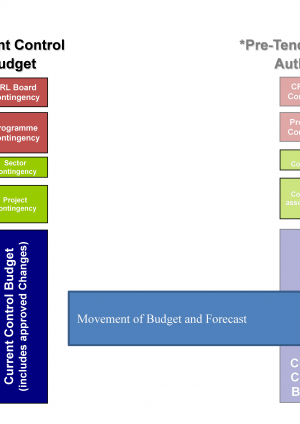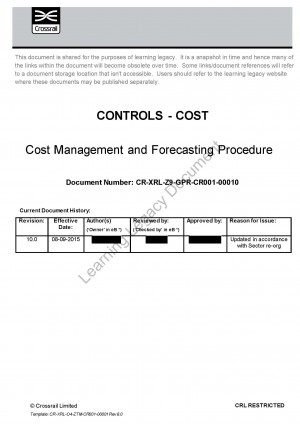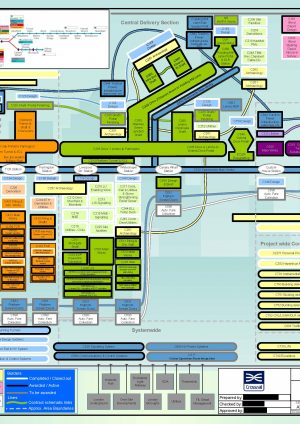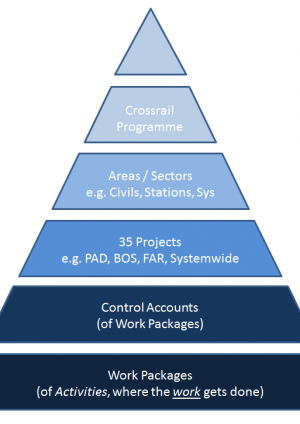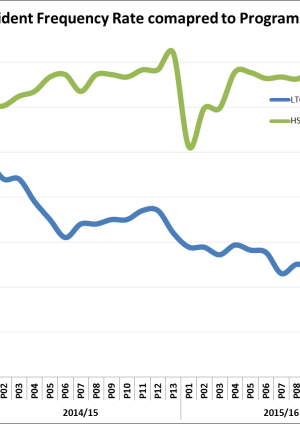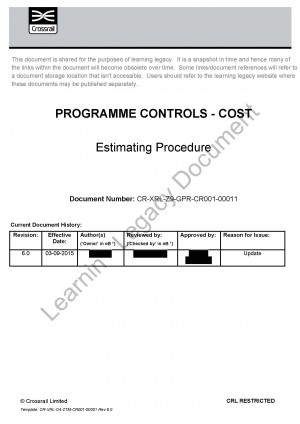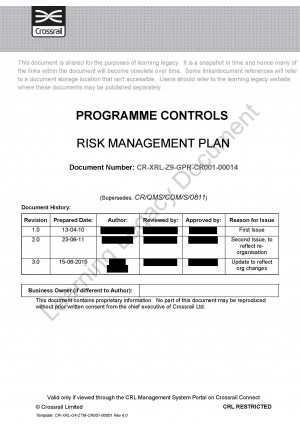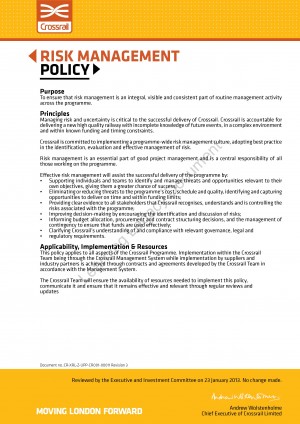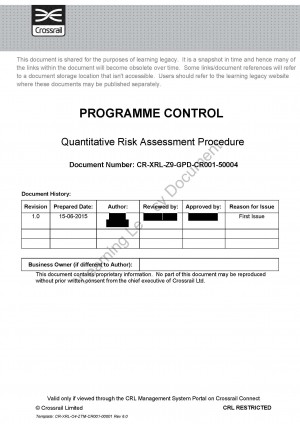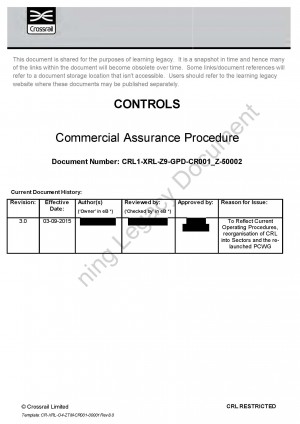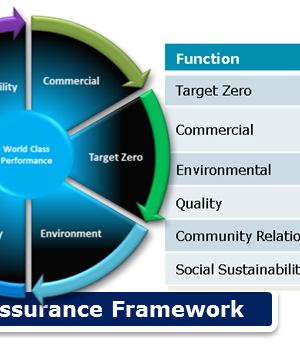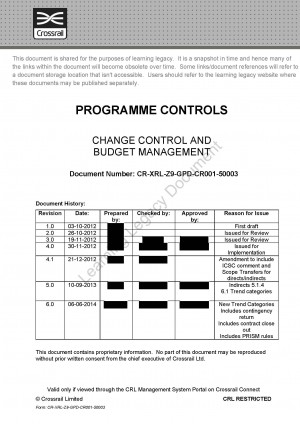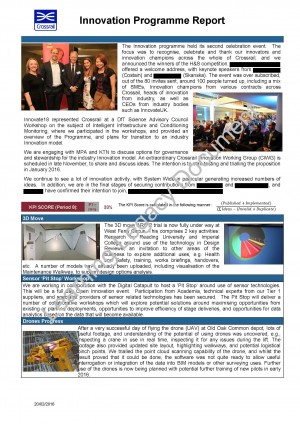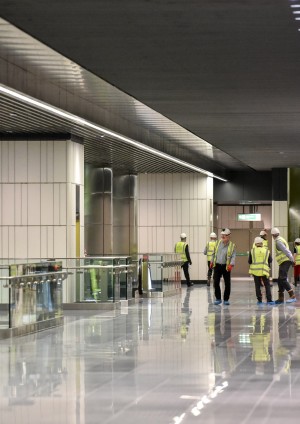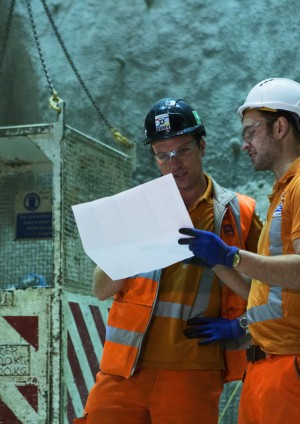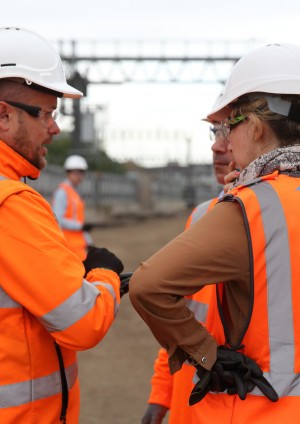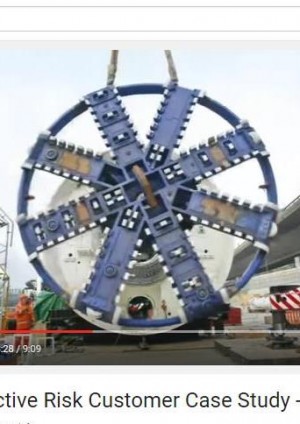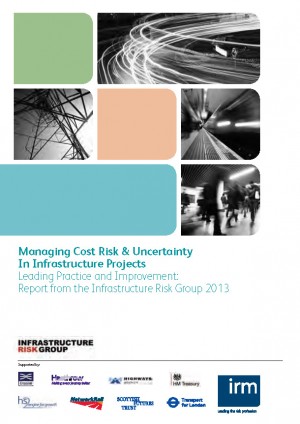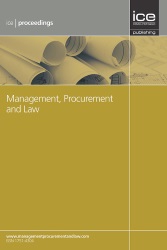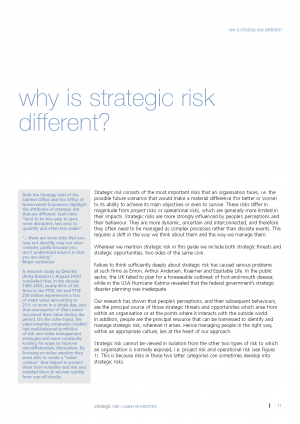
The Programme Controls Team set out to develop a world-class controls function which, through robust reporting and sound programme management protocols, would support the Crossrail programme to deliver the works safely and to time, specification and cost. To this end, the Controls function was built on four key principles. These were to:
- Set the standards: Provide the definition of processes and procedures to be adhered to throughout the programme;
- Provide integrated information: Provide decision makers and members of the Executive, the Board and the Sponsors with reliable and timely information on the current and projected status of the programme;
- Bring foresight and advice: Provide programme level analysis and insight based on interpreting project level data; and
- Provide assurance: Support the management and control of the delivery costs, schedule and performance objectives for the whole programme to minimise risk of failure.
Through the delivery of the core base services of planning, cost management, risk management, programme change management and reporting, the ambition has been met, and continues to evolve as Crossrail heads into the final delivery phase. These learning legacy pages seek to share the processes, systems and some templates with the direct intention of helping others establish an approach that delivers effective but efficient programme controls. Below are some of the key lessons that have been learned to date, including:
- Obtaining agreement on the work breakdown structure and implementing it with zero tolerance;
- The use of Primavera P6 for planning and nothing else;
- Keeping the Controls community out of too much detail;
- Starting formal programme performance reviews early;
- Produce the best management reports you can;
- Reinforcing the culture to build confidence.
Crossrail benefited from the lessons of the London 2012 Olympic and Paralympic Games. Through shared information, Crossrail has maintained simplicity at the heart of its approach. Examples such as the Planning and Scheduling Handbook and the industry leading approach to Performance Management, the use of Earned Value and, later on, Earned Schedule, are all areas of relevance to future projects and programmes.
Crossrail Head of Programme Controls, Richard Palczynski explains Crossrail’s approach to programme controls in this webinar:
| Summary |
Publication date |
Document Type |
Topic area: Programme Controls In early 2020, following the 2018 announcement of significant delay to the opening of Crossrail and the associated cost increases, the Crossrail programme was hit by yet another blow – COVID-19. The programme stopped all work in March 2020 and set about developing a recovery strategy to achieve the original object...
|
05/04/2023 |
Journal Publication |
Topic area: Programme Controls The Crossrail Act for an east–west railway across London was given royal assent in 2008 and construction started on what will become the new Elizabeth line in 2009. This paper looks at how Crossrail Limited, the client delivery organisation, was assembled, how it evolved and what programme and project management prac...
|
19/09/2017 |
Journal Publication |
Topic area: Programme Controls A programme controls approach was needed to integrate commercial management information, to support decision making at the programme and sector level. Periodic Programme Controls Working Group meetings, combined with data and trend analysis, facilitated a good understanding of commercial performance across each of the ...
|
26/02/2016 |
Micro-report |
Topic area: Completing the Elizabeth line event presentations
|
03/05/2023 |
Video |
Topic area: Cost Control This paper describes the use of Project Bank Accounts on the Crossrail project to encourage fair payment and protect subcontractors.
It would be of interest to any project looking to ensure they set up processes to pay their contractors and sub-contractors fairly and in a timely manner, in line with best practice as re...
|
09/07/2018 |
Micro-report |
Topic area: Cost Control This paper outlines both process and `ethos` of Schedule of Cost Component(SoCC) Cost Verification activity on the Crossrail Programme.
The paper outlines how the Cost Verification function provides both, assurance that the Contractors financial systems and controls are aligned to Works Information requirements, and to...
|
09/07/2018 |
Micro-report |
Topic area: Cost Control This paper explains Crossrail’s response to the Government’s 2010 Comprehensive Spending Review, which instigated a comprehensive value management exercise to optimise the programme. This lead to increased sponsor confidence in Crossrail’s affordability, leading to the issue of a Positive Project Revi...
|
09/07/2018 |
Micro-report |
Topic area: Risk Management The robust management of risk has played a significant part in the delivery of Crossrail. This case study explains the approach to risk management that was adopted, the rationale behind it and the outcomes that were experienced. It covers all aspects of risk management in Crossrail and how risk management was integrate...
|
13/03/2018 |
Case Study |
Topic area: Risk Management This document briefly sets out some key features of how Quantitative Cost Risk Analysis (QCRA) has been undertaken on Crossrail. The main focus of this report is on Crossrail’s approach to QCRA which has a degree of originality in comparison to other major projects, particularly in relation to the trend management pr...
|
13/03/2018 |
Micro-report |
Topic area: Risk Management In order to support delivery during the latter stages of the Crossrail programme there were a number of changes made to the risk management resources and processes. This paper focuses on the key changes that were made from 2015 to take the programme to completion.
It will be of interest to any projects and project risk...
|
13/03/2018 |
Micro-report |
Topic area: Risk Management This document briefly sets out some key features of how schedule has been managed and undertaken by Crossrail. The main focus is on Crossrail’s approach to Quantified Schedule Risk Analysis (QSRA) which has a degree of originality, particularly in relation to schedule size and schedule features. This report would be ...
|
13/03/2018 |
Micro-report |
Topic area: Reporting Crossrail is committed to safely deliver a world class railway, on time, and at the lowest possible cost. It is required of all involved in the delivery and management of the programme to drive efficiency and maximise value for money.
In 2015, the Crossrail leadership team agreed cost reduction targets with key project...
|
14/03/2017 |
Micro-report |
Topic area: Risk Management Managing risk and uncertainty was identified as being a critical element from the start of the Crossrail project. The size, complexity, nature of the works, and ‘thin client’ operating model resulted in a requirement to extend risk management into the supply chain. This paper describes the process of doing ...
|
14/03/2017 |
Micro-report |
Topic area: Risk Management For Crossrail Risk and Assurance played a key role in keeping the organisation on track and within its project delivery targets. As a public sector funded project, Crossrail has to provide assurance to a number of external bodies in relation to its governance and effectiveness of delivery. This paper describes its appr...
|
14/03/2017 |
Micro-report |
Topic area: Risk Management From an early stage of the project, managing risk and uncertainty was identified as being critical to the successful delivery of the Crossrail project. The project’s senior management were strongly supportive and actively engaged in implementing the risk management process, which facilitated the creation of a dedicat...
|
14/03/2017 |
Micro-report |
Topic area: Programme Controls Webinar Series This was the seventh in a series of Crossrail Learning Legacy webinars focused on Project and Programme Management hosted by our partners at the APM. This was the final webinar of the series.
The scope of Commercial Assurance spans across the Crossrail Programme, with a particular focus on contracts where Crossrail ha...
|
15/11/2016 |
Video |
Topic area: Reporting Effective reporting is a result of many separate elements of the Crossrail machine working in harmony to transfer understanding rather than transmit information. To do this in a timely and effective way requires supporting systems and structures and for the value of the outputs to be recognised across the Programme.
Th...
|
24/10/2016 |
Case Study |
Topic area: Programme Controls Webinar Series This was the sixth in a series of Crossrail Learning Legacy webinars focused on Project and Programme Management hosted by our partners at the APM.
A key challenge for Crossrail and its stakeholders was to create a mechanism for assuring that Tier 1 contractors were collectively performing at a level that would enable...
|
19/10/2016 |
Video |
Topic area: Reporting The purpose of this handbook is to outline the reporting procedures at Crossrail for producing, issuing and amending progress reports on the programme. It provides information targeted at 3 key groups:
Sponsor, Board, Executive or Crossrail Function members – providing a high level overview of how reporting is carri...
|
27/09/2016 |
Good Practice Document |
Topic area: Planning Crossrail Planning and Scheduling Handbook
The Planning and Scheduling handbook describes how planning is undertaken at Crossrail. It is an intranet based tool that pulls together the various guidance notes and desktop instructions into one page through a series of linked documents as shown below. This handbook is shar...
|
27/09/2016 |
Good Practice Document |
Topic area: Change Management This micro-report describes the process Crossrail used to control change to the Baseline of scope, cost and schedule at Programme level.
|
27/09/2016 |
Micro-report |
Topic area: Change Management This micro-report describes how contingency budgets were established, delegated and managed by Crossrail, and the different categories of contingency budget. It explains the link between contingency and risk management, and control systems.
|
27/09/2016 |
Micro-report |
Topic area: Cost Control This procedure is an integral component to the Crossrail Controls approach and toolset, and applies to all functional departments in the Crossrail Programme responsible for managing and reporting cost. This procedure details the systems, processes, procedures and tools required to identify, collect, integrate and analy...
|
27/09/2016 |
Good Practice Document |
Topic area: Change Management This micro-report describes the process to establish the Crossrail Programme Baseline and the components of the Baseline, including the high level Work Breakdown Structure.
|
27/09/2016 |
Micro-report |
Topic area: Cost Control This micro-report gives an overview of how the work breakdown structure (WBS) has been developed and how it is maintained and controlled across the Crossrail programme through the Cost Management System (PRISM). It will be of interest to all those delivering major and complex projects.
|
27/09/2016 |
Micro-report |
Topic area: Health and Safety improvements The Health and Safety Performance Index (HSPI) is Crossrail’s leading indicator measurement programme, focussed on Crossrail’s 6 Target Zero Pillars, which are considered the foundation for good health and safety management. These are; Leadership & Behaviour; Design for H&S; Communications; Workplace Heal...
|
27/09/2016 |
Case Study |
Topic area: Cost Control This document sets out the role of the Programme Controls Estimating Team and the procedures and approach undertaken in the preparation of estimates and other activities that were identified as being the responsibility of the estimating team.
This procedure applies to the central estimating team and identifies the inte...
|
27/09/2016 |
Good Practice Document |
Topic area: Risk Management Managing risk and uncertainty is vital to the successful delivery of Crossrail. This Risk Management Plan describes the activities, governance, roles, responsibilities and process which are required to ensure that Crossrail manages its risks effectively. It forms part of a consistent suite of documentation which descri...
|
27/09/2016 |
Good Practice Document |
Topic area: Risk Management Managing risk and uncertainty is critical to the successful delivery of Crossrail. This Risk Management Policy was put in place to ensure that risk management is an integral, visible and consistent part of routine management activity across the programme. It also outlines how effective risk management can support progr...
|
27/09/2016 |
Good Practice Document |
Topic area: Risk Management The purpose of this procedure is to set out how Quantitative Risk Assessment (QRA) is undertaken on Crossrail. It represents a quality plan for achieving Crossrail risk management objectives. It is written to accord with the:
Crossrail Risk Management Plan
Crossrail Risk Management Procedure
Change Control and Budget ...
|
27/09/2016 |
Good Practice Document |
Topic area: Commercial Assurance This document sets out the agreed process for operating Crossrail’s Commercial Assurance Function. The purpose is to provide a clear and consistent overview of:
the vision for Commercial Assurance
the process of operating Commercial Assurance
accountabilities for the implementation of Commercial Assurance
The scope...
|
27/09/2016 |
Good Practice Document |
Topic area: Programme Controls Webinar Series This was the fifth in a series of Crossrail Learning Legacy webinars focused on Project and Programme Management hosted by our partners at the APM.
From an early stage Crossrail recognised that managing risk was critical to the success of the programme. Crossrail implemented risk management across the organisation wit...
|
22/09/2016 |
Video |
Topic area: Programme Controls Webinar Series This was the fourth in a series of Crossrail Learning Legacy webinars focused on Project and Programme Management hosted by our partners at the APM.
The Planning function in Crossrail supports the overall delivery and reporting requirements of the business. The planning methodology is detailed in the Planning and Sche...
|
15/09/2016 |
Video |
Topic area: Programme Controls Webinar Series The third webinar in the series on Crossrail Programme Controls covered the establishment of the programme baseline of scope, cost and schedule, and the process to control change to the baseline at programme level. It described how contingency budgets were established, delegated and managed, and refers to the control s...
|
01/09/2016 |
Video |
Topic area: Programme Controls Webinar Series This was the second in a series of Crossrail Learning Legacy webinars focused on Project and Programme Management hosted by our partners at the APM.
As a high profile, highly complex programme with a large number of internal and external stakeholders, Crossrail has diverse user groups for its management information. T...
|
28/07/2016 |
Video |
Topic area: Programme Controls Webinar Series This was the first in a series of Crossrail Learning Legacy webinars focused on Project and Programme Management, hosted by our partners at the APM.
This webinar aims to provide an overview of the programme controls put in place on the programme.
The Crossrail Programme Controls Team set out to develop a world-class c...
|
15/06/2016 |
Video |
Topic area: Audit & Assurance Crossrail’s approach to performance measurement was based on 6 core areas aligned to corporate objectives, using traditional quantitative based KPIs but supplemented with qualitative based assessments of the supply-chain’s maturity to provide a much richer picture of supply-chain performance. This enabled the tar...
|
26/02/2016 |
Micro-report |
Topic area: Change Management The purpose of this procedure is to define the processes which apply to the control of change and the management of budgets and forecasts. This procedure covers:
the Change Management process to establish a methodology for the review, mitigation and approval of all changes from the approved Programme Baseline. This in...
|
26/02/2016 |
Good Practice Document |
Topic area: Innovation Programme Example of a report from the Innovation Programme which fed into the Crossrail period report, describing activities and challenges.
|
26/02/2016 |
Good Practice Document |
Topic area: Quality ‘Right First Time‘ is a key factor in the success of any project. As part of its quality management process, Crossrail developed a quality dashboard with meaningful metrics that enabled trend analysis and informed decision making to rectify problems and prevent recurrence.
This learning legacy page describes the co...
|
26/02/2016 |
Micro-report |
Topic area: Cost Control The aim of the Crossrail performance measurement regime was to provide a comprehensive, consistent, timely and reliable view of the programme’s performance that predicted performance, and triggered management action to positively influence the outcome. Earned Value (EV) was one indicator of performance and was used i...
|
26/02/2016 |
Micro-report |
Topic area: Cost Control This report summarises Crossrail’s approach to Estimating, to provide predictability around capital investment and operating costs as well as the critical evaluation of affordability and value for money. This report sets out the role of the Programme Controls Estimating Team, the procedures and approach undertaken as...
|
26/02/2016 |
Micro-report |
Topic area: Planning Reporting is a necessary requirement for all projects and developing the methodologies adopted by Crossrail for schedule management and reporting has been key to the success of the programme so far. This learning legacy paper provides an overview of some of the key principles adopted by Crossrail in the delivery of t...
|
26/02/2016 |
Micro-report |
Topic area: Planning Identification and definition of interfaces has been critical to the success of Crossrail so far, especially given the number of different Industry Partners involved in delivering the infrastructure. This learning legacy paper provides an overview of some of the key principles adopted by Crossrail in the delivery of ...
|
26/02/2016 |
Micro-report |
Topic area: Planning Crossrail defines a commodity as a measurable piece of work (eg, linear metres of tunnelling, track laying, platform concrete poured etc). It was recognised that the early identification and monitoring of key commodities was critical to programme success and effective decision making.
Undertaking Commodity reporting...
|
26/02/2016 |
Micro-report |
Topic area: Planning Planning of detailed design is often seen as abstract and difficult to measure progress against. This learning legacy paper describes how Crossrail, in conjunction with the design gates in the V-Lifecycle (Validation and Verification) technical assurance process, developed a detailed design programme in P6 and lear...
|
26/02/2016 |
Micro-report |
Topic area: Risk Management A number of videos have been produced outlining the importance of risk management to Crossrail and also detailing how it is important for the project to consider the risk strategy when working with contractors and the wider supply chain.
Each of the videos are linked below:
The importance of Risk Management to the...
|
26/02/2016 |
Video |
Topic area: Risk Management In 2015 Infrastructure UK undertook a review of the cost of infrastructure projects in the UK and how this cost could be reduced. One workstream researched the management of cost risk and uncertainty throughout the project lifecycle, the incentive being to significantly reduce the cost of projects by curbing unnecess...
|
30/12/2013 |
Good Practice Document |
Topic area: Risk Management Following the positive outcome from the UK government’s 2010 comprehensive spending review, the Crossrail cross-London railway project started awarding its main construction contracts. The author explains how risk management has already benefited the project and why its adoption by the supply chain is critical.
Acce...
|
30/05/2011 |
Journal Publication |
Topic area: Risk Management Strategic risk consists of the most important risks that an organisation faces, i.e. the possible future scenarios that would make a material difference (for better or worse) to its ability to achieve its main objectives or even to survive. These risks differ in magnitude from project risks or operational risks, which...
|
01/05/2006 |
Journal Publication |


